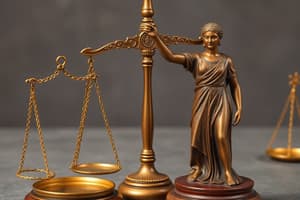Podcast
Questions and Answers
According to Aristotle, '______ should be treated equally'
According to Aristotle, '______ should be treated equally'
equals
Justice is an order and duty of the parts of the ______, it is to the soul as health is to the body
Justice is an order and duty of the parts of the ______, it is to the soul as health is to the body
soul
Justice means giving each person what he/she ______
Justice means giving each person what he/she ______
deserves
Fairness is an ability to judge without reference to one's ______
Fairness is an ability to judge without reference to one's ______
Economic fairness and justice revolve around the equitable distribution of ______ and opportunities
Economic fairness and justice revolve around the equitable distribution of ______ and opportunities
The principles of due process, equal protection, and the rule of ______ are central to ensuring fairness and justice within legal frameworks
The principles of due process, equal protection, and the rule of ______ are central to ensuring fairness and justice within legal frameworks
Fairness and justice are fundamental principles that underpin the functioning of ______ and institutions.
Fairness and justice are fundamental principles that underpin the functioning of ______ and institutions.
Justice is derived from a Latin word '______' meaning right or law.
Justice is derived from a Latin word '______' meaning right or law.
A just person obeys the ______ and does what is right (morally, ethically).
A just person obeys the ______ and does what is right (morally, ethically).
Synonymously, Justice means ______, that is giving to persons what is due to them.
Synonymously, Justice means ______, that is giving to persons what is due to them.
Fairness and justice are essential elements for creating a ______ and equitable social order.
Fairness and justice are essential elements for creating a ______ and equitable social order.
Economic theories, such as ______, libertarianism, and welfare economics, offer different approaches to achieving fairness and justice in economic systems.
Economic theories, such as ______, libertarianism, and welfare economics, offer different approaches to achieving fairness and justice in economic systems.
Educational ______, inclusive education, and affirmative action are key concepts in promoting fairness and justice in educational settings.
Educational ______, inclusive education, and affirmative action are key concepts in promoting fairness and justice in educational settings.
Addressing educational disparities based on ______, socioeconomic status, or gender is essential for creating a just society.
Addressing educational disparities based on ______, socioeconomic status, or gender is essential for creating a just society.
Ensuring social justice involves addressing ______ discrimination, promoting human rights, and fostering social cohesion.
Ensuring social justice involves addressing ______ discrimination, promoting human rights, and fostering social cohesion.
Political justice entails fair representation, democratic processes, and protection of ______ liberties.
Political justice entails fair representation, democratic processes, and protection of ______ liberties.
These include ______ relativism, conflicting interpretations of fairness, and balancing individual rights with collective well-being.
These include ______ relativism, conflicting interpretations of fairness, and balancing individual rights with collective well-being.
Fairness and justice are multifaceted concepts that are essential for the functioning of ______ and institutions.
Fairness and justice are multifaceted concepts that are essential for the functioning of ______ and institutions.
The intersectionality of social identities and power structures adds complexity to achieving ______ and justice.
The intersectionality of social identities and power structures adds complexity to achieving ______ and justice.
Challenges exist, but an ongoing commitment to understanding and promoting ______ and justice is crucial for creating a more equitable and inclusive world.
Challenges exist, but an ongoing commitment to understanding and promoting ______ and justice is crucial for creating a more equitable and inclusive world.
Fairness and justice have diverse implications across academic disciplines, ranging from ______ and ethics to economics and education.
Fairness and justice have diverse implications across academic disciplines, ranging from ______ and ethics to economics and education.
By critically examining these concepts, we can foster meaningful dialogue and drive positive change towards a ______ society.
By critically examining these concepts, we can foster meaningful dialogue and drive positive change towards a ______ society.
An ongoing commitment to understanding and promoting fairness and justice is crucial for creating a more ______ and inclusive world.
An ongoing commitment to understanding and promoting fairness and justice is crucial for creating a more ______ and inclusive world.
Study Notes
Justice and Fairness
- Justice is a central concept in morality and is consistently linked to ethics and morality in Western civilization.
- Justice means giving each person what they deserve, and is considered lawful and fair.
Theories of Justice
- Aristotle's perspective: "Equals should be treated equally", and people get what they deserve.
- Plato's perspective: Justice is a human virtue and the bond that joins people together in society, and is an order and duty of the parts of the soul.
Kinds of Justice
- Fairness and Justice in Law and Ethics: essential for creating a just legal system, with principles like due process, equal protection, and the rule of law.
- Fairness and Justice in Economics: revolves around the equitable distribution of resources and opportunities, with consideration of social identities and power structures.
- Fairness and Justice in Education: critical in educational systems to ensure equal access to quality education, with concepts like educational equity, inclusive education, and affirmative action.
- Fairness and Justice in Social and Political Contexts: determines the distribution of power, rights, and opportunities, with consideration of social justice, human rights, and social cohesion.
Challenges and Critiques
- Cultural relativism, conflicting interpretations of fairness, and balancing individual rights with collective well-being are some of the challenges and critiques of fairness and justice.
Studying That Suits You
Use AI to generate personalized quizzes and flashcards to suit your learning preferences.
Description
Explore the principles of justice and fairness, including different kinds of justice and the responsibilities of the state and citizens. Understand the fundamental concepts that underpin societies and institutions.




